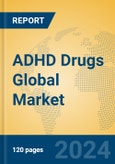Market Size
As of 2023, the global ADHD drugs market was valued at approximately USD 29 billion. The market is projected to grow at a compound annual growth rate (CAGR) of around 7.5% from 2024 to 2029, indicating robust growth driven by rising incidences of ADHD, innovations in drug formulations, and a more extensive array of available therapies.Share & Trends Analysis Report
By Product Type
- Stimulants: Dominating the market share, stimulants such as methylphenidate and amphetamines accounted for approximately 80% of total market revenue in 2023. These drugs are preferred due to their established efficacy in managing ADHD symptoms.
- Non-Stimulants: Non-stimulant medications like atomoxetine held around 20% of the market share. These drugs are gaining traction among patients who prefer a lower potential for abuse.
By Key Players
The competitive landscape of the ADHD drugs market is characterized by several key players, including:- Shire Pharmaceuticals
- Novartis AG
- Janssen Pharmaceuticals (Johnson & Johnson)
- Ritalin (Medikinet)
- Pfizer Inc.
- Eli Lilly and Company
- Neos Therapeutics
By Process
- Prescription Drugs: The large majority of ADHD medications require a prescription, contributing significantly to the market by ensuring professional medical oversight in treatment.
- Over-the-Counter (OTC): A minor segment of the market, focusing primarily on dietary supplements and herbal remedies claimed to help manage ADHD symptoms.
By Application
The therapeutic applications of ADHD drugs primarily include:- Pediatric Applications: Approximately 70% of ADHD diagnoses occur in children aged 6-12, making this the largest application sector.
- Adult Applications: The recognition of adult ADHD has surged recently, with adults now accounting for about 30% of the treatment market.
By End-Use
The end-use analysis reveals a strong demand across various settings:- Hospitals and Clinics: Over 60% of ADHD treatments are administered in clinical settings, driven by the need for comprehensive evaluation and supervision.
- Homecare: An emerging segment, patients are increasingly opting for telehealth services for ADHD management.
By Region
The ADHD drugs market is segmented geographically, with the following insights:- North America: The largest market share, accounting for approximately 45% of the global revenue due to high awareness, advanced healthcare infrastructure, and high prescription rates.
- Europe: Holding around 25% of the market share, with increased investments in R&D and favorable reimbursement policies.
- Asia-Pacific: Expected to grow at the highest CAGR of 9% by 2029, due to rising incidence rates and increased healthcare expenditures.
Market News and Policy Updates
Recent regulatory changes have emphasized the importance of ADHD awareness and treatment. In many regions, including the U.S. and Europe, health authorities have prioritized funding and programs to educate the public about the disorder, thereby fostering a conducive environment for drug acceptance and usage. Noteworthy collaborations between pharmaceutical companies and educational institutions have been initiated, targeting research into new ADHD treatments and innovative drug delivery systems.Companies are also focusing on enhancing patient adherence through patient support programs, digital monitoring tools, and customized treatment plans. Furthermore, there is an increasing trend towards the development of combination therapies that could enhance effectiveness while minimizing side effects.
Segment Forecasts, 2024 - 2029
The ADHD drugs market is poised for notable growth across several segments:- Stimulants: Expected to maintain dominance, projected to grow at a CAGR of 7.3% from 2024 - 2029.
- Non-Stimulants: Anticipated to grow at a higher rate of 8.5%, as more physicians and patients explore these options.
- Pediatrics: The largest segment in terms of application, expected to see a growth rate of 7.7% during the forecast period.
- Adult Treatment: Forecasted to grow at 9% as awareness for adult ADHD rises and more adults seek treatment.
Conclusion
The ADHD drugs market is evolving rapidly, with ongoing innovations, increasing prevalence, and improved public awareness slated to drive growth over the next five years. Stakeholders must focus on developing safer, more effective treatment options, enhance patient engagement strategies, and adapt to changing health regulations to capitalize on this expanding market.As more individuals seek effective management for ADHD symptoms, the role of pharmaceutical companies, healthcare providers, and policymakers will be critical in shaping the future landscape of ADHD treatment.
This product will be delivered within 1-3 business days.
Table of Contents
Companies Mentioned
- Takada
- Janssen
- Novartis
- Tris Pharmaceuticals
- Rhodes Pharmaceuticals
- Osomotica Pharmaceuticals
- Ironshore Pharmaceuticals
- Adlon Therapeutics
- Neos Therapeutics








